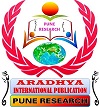VOL- 7, ISSUE- 1, PUNE RESEARCH DISCOVERY (ISSN 2455-9202) JIF 3.01
7.1 DISCOVERY
Area of Article : ALL

VOL- 7, ISSUE- 1, PUNE RESEARCH DISCOVERY (ISSN 2455-9202) JIF 3.01
7.1 DISCOVERY

VOL- 7, ISSUE- 1, PUNE RESEARCH DISCOVERY (ISSN 2455-9202) JIF 3.01
7.1.1 DISCOVERY

Performance
appraisal may be defined as a structured formal interaction between a
subordinate and supervisor, that usually takes the form
of a periodic interview (annual or semi-annual), in which the work performance
of the subordinate is examined and discussed, with a view to identifying
weaknesses and strengths as well as opportunities for improvement and skills
development. Performance appraisal is a part of career development. But managing human resources in today’s
dynamic environment is becoming more and more complex as well as important.
Recognition of people as a valuable resource in the organization has led to
increases trends in employee maintenance, job security, etc. this research
paper deals with “Performance Appraisal as carried out at Automobiles companies
in Bhosri Pune.
Key Words: Performance appraisal system. Employee’s
individual contribution and team performance indicators
VOL- 7, ISSUE- 1, PUNE RESEARCH DISCOVERY (ISSN 2455-9202) JIF 3.01
7.1.2 DISCOVERY

In
the present paper an attempt has been made to compare dyslexic teacher trainees
on the basis of moderator variables i.e., Gender (Male and Female) and Locality
(Urban and Rural) along with five areas of dyslexia namely, (i) emotional
intelligence, (ii) movements and perceptions, (iii) structure and sequence,
(iv) short term memory, and (v) language and communication. The teacher
trainees studying in the academic year 2018-19 were chosen as the samples of
the study and were drawn by purposive sampling technique. The data was
collected using a questionnaire constructed and validated by the researcher.
The data was analyzed using descriptive statistics. The results revealed that,
Male teacher trainees exhibit higher scores of Dyslexia as compared to female
teacher trainees. However, male teacher trainees exhibit higher scores for the
dimensions of Dyslexia i.e., Emotional Intelligence, Movement and Perception,
Structure and Sequence, Short-term Memory and Language and Communication as
compared to female teacher trainees. Findings further revealed that, teacher
trainees hailing from rural localities exhibit higher scores of Dyslexia as
compared to those belonging to urban localities. Whereas, teacher trainees
hailing from rural localities exhibit higher scores for the dimensions of
dyslexia i.e., Emotional Intelligence, Movement and Perception, Structure and
Sequence, Short-term Memory and Language and Communication as compared to those
belonging to urban localities.
Key words: Dyslexic teacher trainees, emotional
intelligence, movements and perception, structure and sequence, short term
memory and language and communication etc.
VOL- 7, ISSUE- 1, PUNE RESEARCH DISCOVERY (ISSN 2455-9202) JIF 3.01
7.1.3 DISCOVERY

English
language teaching in engineering colleges in itself demands sympathetic
attitude of the management of the institution, sincere and attentive motivation
of the students and of course the creative and motivating guidance of English
teachers. Since the employability of the engineering graduates depends by and
large upon the English language skills that need to be honed in them
maintaining the standard compatible to global understanding. Of late it has
occurred in the mind of the curriculum designers that mere technological
knowledge imparted to the graduates is not sufficient enough to ensure their
competence in the job market. So on much demand separate departments of
humanities are carved out in technical institutions. English teachers are
recruited by these institutions to take care of the future of the would-be
technocrats in India. Mostly the subject gets its fantastic title like
Technical Communication, Personality Development, Soft Skills etc. and very
rarely English Language. This shows a very pathetic condition because English language
teaching in engineering colleges is not being taken on priority basis. The
medium of instruction to supply technological knowledge is English and due
mainly to the second rate treatment given to it by the teachers other than
English teachers has corrupted the English language up to the extent that the
students’ interest is flagged and they do not take this subject proper in their
serious thinking domain. This article may prove to be very inspiring to those
who have taken English teaching and learning in engineering colleges as a
challenge and whose endeavor is to bring innovations in the methodology of teaching
English language in India. English grammar teaching can be made interesting
once it is introduced in the classroom by framing a context that suits the
language learning aptitude of the students.
Keywords: English Language Teaching, Language Skills,
Engineering Colleges, Bridge course